Tony Hawkins: "There are many possibilities of using new design networks"
What is the main difference between the North Sea and the Atlantic from the fishing point of view?
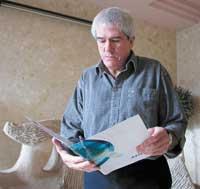
I don't think there are big differences. To some extent, fish stocks are exploited in both seas, especially in the pelagic area. The difference is in management systems, which have been developed in different ways.
The North Sea is an area of fisheries of great tradition but in which scientists have always participated. ICES is a very old organization, with more than a hundred years of existence. There are many people who think it's good to be so old, but I see that now the organization is not as efficient as in the past.
I think the Baltic, the Atlantic, the North Sea and the Mediterranean can be managed in the same way, but so far it has not been done because they are culturally different. These differences make the separate management of each of them invalid.
In the North Sea there are many oil industries. How does this industry affect fishing?
There are numerous oil platforms in the North Sea, an already heavily exploited oil zone. In addition, this industry is now spreading to the Atlantic, west of the Shetland Islands. There is a lot of concern about possible serious accidents and we have already seen some. For example, the Piper Alpha platform caught fire, we feared that PCBs would be poured into the North Sea.
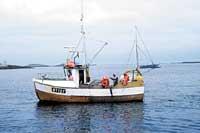
In addition, analyses of fish caught anywhere in the North Sea detect traces of hydrocarbons. This is a consequence of the existence there of an oil industry. It is not a very serious problem, but it is not good. No one wants high concentrations of contaminants in fish. However, the oil industry is considered much more important than fishing and, to some extent, management in these areas has been permissive in the past. Now the situation improves, both industries are incompatible. However, stricter rules and controls will be needed.
On the other hand, oil tankers passing near the North Sea and the vulnerable coasts of western Scotland have also caused great concern. In the Shetland Islands we saw what can happen to these ships when the Braer boat was sunk and we have followed the problem that the Prestige has generated on the west coast of Spain. We are all concerned about these problems, but especially fishermen.
At the end of its useful life, numerous platforms are being dismantled in the North Sea. Does that mean the oil industry is declining?
The North Sea oil zone is extending its life. At first the experts thought it would end soon, but it is not so. These areas have been reused now. We hope that this exploitation will continue. Initially the governments promised that oil platforms would be dismantled when the industry was down, but logically those orders have been overturned and some platforms will continue to work.
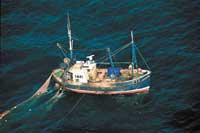
This reduces the likelihood of fishing and raises concerns about pollution. The suburbs defend the withdrawal of the platforms, but now the governments say it would be very expensive.
Cod fishing in the North Sea has now been banned, but other species are caught next to it, such as the haddock. What does it mean to ban cod fishing?
The current problem is the amount of cod, especially south of the North Sea. It may be due to overexploitation of cod, but some believe it may be due to climate change. For one reason or another, it is clear that cod has headed north of the North Sea and that traditional coves are now very scarce.
That of the abbot is a different case. Now in the North Sea there are many abbeys, this year is very prosperous and the sea is full. It is very fishing. But there is a problem with the abadejo: year after year it is very variable, sometimes it is a lot and the following year perhaps very little, and you have to wait for it to come again in large quantity.
Therefore, at the moment there are good conditions for fishing, but the future of the abadejo worries us. While the situation is so, fishermen believe they have the right to continue fishing the abbot. But as it is a combined fishing, that is, that together with the cod is fishing in the same network, the share of the abadejo and other species has been reduced to protect the stock of cod.
I think there are many possibilities of using new design networks. With these nets they capture the haddock and the liba, but let out the cod. They have the same problem in North American waters, where they use the resources that characterize the species, since cod and haddock do not behave in the same way if they enter the network. The haddock tends upwards, while the cod descends to the bottom of the sea. Therefore, the net can be divided into two, so that the haddock would catch in the upper half and the cod in the lower one, then let it escape.
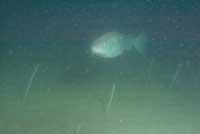
Unfortunately, the European Commission does not trust these methods. They prefer to limit the days and quotas on which they can fish, having no interest in technological developments. I think it's a mistake.
They should look for new methods. In addition, these methods are not only applied with white and bottom fish, but also with prawns and similar animals. Also in this fishery the cod is accidentally caught. But it is easy to adapt the nets by letting cod escape to capture prawns. Again, the Commission is not interested in such solutions. But they will have to learn. I think these methods are the future of all fisheries.
In the case of Newfoundland, after ten years of banning cod capture, the population has not been recovered. Do you think the same will happen in the North Sea?
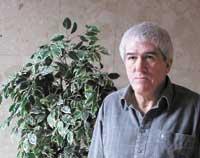
It is a difficult question to answer. According to the most accepted theory at this time, the reduction of cod is almost entirely due to fishing and a reduction of pressure on fish will allow a rapid recovery of the population. It is believed that in the North Sea it will recover faster than in Newfoundland, Newfoundland, due to the rapid growth of cod, much faster than in the cold waters of Newfoundland. Therefore, if enough cod remains, they will quickly reach the breeding age. The biomass available for reproduction would increase in two or three years.
However, we do not know how much the climate affects cod. The climate is changing. If the real problem is temperature change and there are indications that this is so, it may take a long time to recover cod. So the question is: Is it worth taking drastic steps to try to recover cod south of the North Sea? It may not have the capacity to recover populations. Should we limit the quotas of all other fish, although this does not benefit cod?
How can they affect protected areas that completely ban fishing?
Protected spaces are of great importance, but there are also problems. Last year, the European Commission closed breeding areas, but did not set limits on fishing. Therefore, they began fishing near these areas cut by the boat, with an important capture of ripe cod. Therefore, the goal was not finally reached.
However, I believe that protected spaces can meet a goal. From my research I know that young cod grows near the coast. In the 1970s these areas were closed to boat traffic, which allowed the cultivation of cod in these areas, and later to head to the main coves. These areas are now open, fishermen can approach the beaches. In my opinion, this is not right, it would take an exclusive area for cod and should be protected. Fishermen should not be allowed to enter this area.
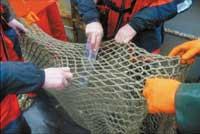
On the other hand, these types of areas have a number of advantages. When the breeding of cod and haddock is investigated, the complexity of the behavior of these species is evident. The abbey forms territories at sea and both species have complex social structures. This means they form large groups of fish and use sounds to communicate. Reproduction is therefore a very complex process.
Therefore, it is not a good idea for boats to circulate in these areas when fish are growing. It disrupts the reproductive process and hinders the behavior of consolidation of territories. And it is very important to close them when necessary. Fishing around these breeding areas should also be prohibited. Other fish are also playing around. Ships should be far from these areas.
ICES: The
International Council for the Exploration of the Sea. Founded in 1902 with the aim of learning as much as possible about the sea. Currently there are 19 member countries of the ICES/CIEM. It coordinates marine research in the North Atlantic and adjacent seas, including the Baltic and the North Sea.
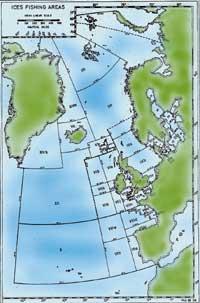
The accident
of the Piper Alpha platform, on 8 May 2002, a fishing boat hit one of the legs of the Piper Alpha platform. This platform, located in the North Sea, 27 miles from the Yorkshire coast, is used for gas extraction, probably due to the absence of radars on the platform. Immediately after the accident all workers were evacuated. They feared what could happen because in 1988 167 workers died on the platform for a fire.
The oil tanker Braer
in 1993 sank the oil tanker Braer on the coast of the Shetland Islands in northern Scotland. The accident occurred on January 5, so it has been nine years since then. This vessel poured some 85,000 tons of oil into the sea.
Buletina
Bidali zure helbide elektronikoa eta jaso asteroko buletina zure sarrera-ontzian








